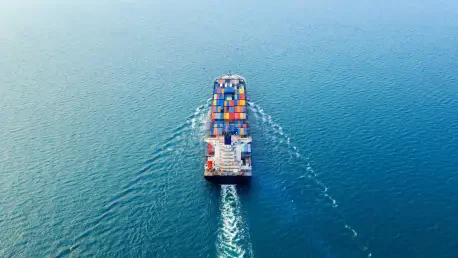In this insightful interview with Rohit Laila, a veteran of the logistics industry and a forward-thinker in technology and innovation, we explore the dynamic interplay between data and artificial intelligence in shaping the marine logistics industry. Rohit brings his deep expertise to address the challenges of data management and the transformative power of AI, offering a glimpse into how these technologies are crafting the future of marine logistics.
How is the influx of data shaping the current landscape of marine logistics?
The vast influx of data in marine logistics is both transformative and challenging. On one hand, it provides unprecedented opportunities for enhancing visibility and efficiency. However, the sheer volume can be overwhelming, complicating decision-making processes. The real task is sifting through this data to uncover actionable insights, thereby enabling us to make informed decisions swiftly and accurately.
What are the main challenges faced by logistics professionals concerning data in the marine sector?
The primary challenges lie in the diversity of data sources and the resultant complexity in operations. Data from varied sources like weather patterns and river conditions can be hard to consolidate and interpret. This fragmentation makes it difficult to paint a clear operational picture, often leading to inefficiencies and delays in decision-making.
How do agencies like NOAA and USACE support marine logistics operations?
Agencies like NOAA and USACE play a pivotal role by providing critical data related to weather and waterway conditions. Their data is essential for making informed decisions on navigation and scheduling, helping to avoid obstacles that could potentially disrupt operations. However, the challenge remains in how to effectively integrate and apply this data in real-time operations.
Can you elaborate on the issues arising from cognitive biases and limited perspectives in marine logistic operations?
Cognitive biases often lead to misinterpretations of data, as individuals might see what they expect rather than the reality. This can result in overlooking important inefficiencies or trends, which are crucial in avoiding costly mistakes. Overcoming these biases is essential for extracting meaningful insights from complex datasets.
How is artificial intelligence changing the efficiency of operations in marine logistics?
AI is revolutionizing marine logistics by enhancing operational efficiency and facilitating strategic decision-making. AI systems can quickly analyze vast datasets, uncovering patterns and trends that are beyond human detection. For instance, AI can predict weather impacts on ETAs or spot shifts in demand, enabling timely scheduling adjustments. It also manages data from traditionally unstructured formats, transforming them into actionable insights.
What roles do humans still play in the era of AI-driven marine logistics?
Despite AI’s capabilities, human judgment remains irreplaceable. AI processes data with speed and precision, but humans provide the strategic thinking and contextual understanding necessary for real-world decision-making. The blend of AI with human expertise ensures decisions are both data-driven and contextually relevant.
Where do current gaps in data visibility exist within the inland marine transportation sector?
Data visibility gaps often exist due to fragmented, delayed, or inconsistent data sources. These gaps impede real-time awareness of asset or cargo locations, leading to inefficiencies and reactive schedule adjustments. It is crucial to enhance data flow and integration to improve situational awareness across the supply chain.
How can marine logistics move away from traditional data processes to enhance situational awareness?
Transitioning from traditional data processes to AI-assisted systems is key. This evolution enables continuous monitoring and smarter data aggregation, reducing the manual labor involved in interpretation. Such systems can greatly improve situational awareness, leading to more proactive and resilient operations.
What are the perceived barriers to the mass adoption of AI in the marine logistics industry?
The main barriers include skepticism about AI as a “black box” and a general resistance to change rooted in traditional processes. Operators need to understand AI’s decision-making processes to trust its recommendations. Overcoming this skepticism will involve transparency and education about AI capabilities and applications.
How can marine logistics find a balance between AI technology and human expertise?
Achieving balance involves leveraging the strengths of both AI and human insight. AI can handle large data sets rapidly, while humans interpret those results in context. This collaboration can transform the sector into a proactive entity, efficiently managing and anticipating disruptions.
How does AI help predict and prevent disruptions in the supply chain?
AI can anticipate disruptions by analyzing data patterns and predicting potential issues before they occur. This capability allows logistics providers to mitigate risks proactively, minimizing impacts on the supply chain and improving overall reliability and efficiency.
What benefits can early adoption of AI bring to marine logistics companies?
Early adopters of AI can gain a competitive edge through enhanced decision-making capabilities and operational efficiency. Aligning AI technology with strategic business goals ensures that it strengthens, rather than dictates, company operations, fostering sustainable growth.
How is marine logistics evolving due to the explosion of data and technological advances?
The sector is evolving rapidly, with data and technology driving significant changes. External factors such as global trade fluctuations and environmental concerns add to the complexity. However, with AI and technological advances, companies can navigate these challenges more effectively, improving efficiency and resilience.
In what ways can a collaborative approach between industry experience and AI technology drive the future of marine logistics?
A collaborative approach leverages AI’s analytical power with human experience, leading to smarter, more informed decision-making. This synergy not only improves current operations but also positions the industry to innovate and proactively address future challenges.
How can embracing change position logistics professionals to shape the industry’s future and maintain competitiveness?
Embracing change is critical for staying competitive. By adapting to technological advances and integrating AI, logistics professionals can drive innovation, improve efficiencies, and ensure the sector’s vitality for future generations.









